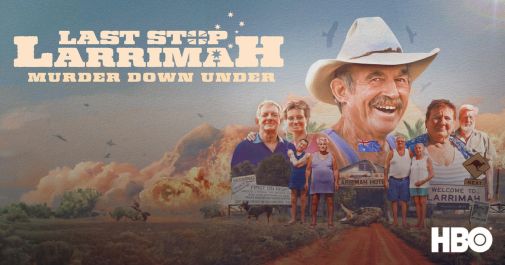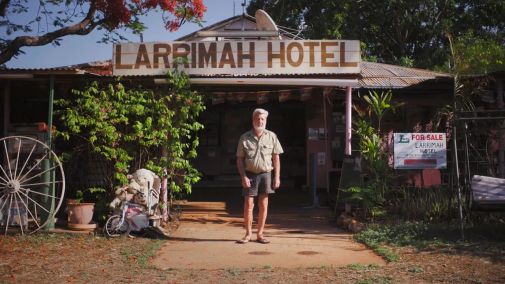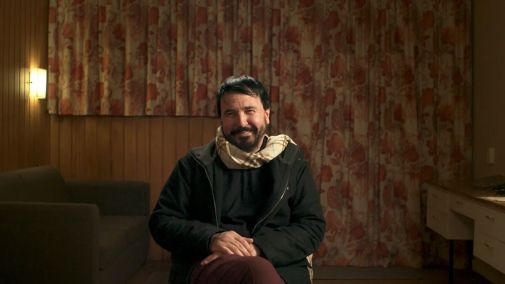Doc Corner: 'Last Stop Larrimah' and 'Mister Organ' are a return to true crime
 Sunday, October 15, 2023 at 1:00PM
Sunday, October 15, 2023 at 1:00PM 
The popularity of true crime as a subgenre appears to have subsided dramatically in the last couple of years. Following the boom times, it seems following the uber-success of Tiger King, the film, television and podcasting staple has receded somewhat from public consciousness. Although there is no shortage of new titles littering the catalogues of streaming services week on week, two new titles with antipodean links feel like a modest but successful return to the spotlight.
Speaking of Tiger King, the first of these two films is one that appears to very much takes some inspiration from that Floridian nightmare. It does it better, though, I would say.
For starters, Thomas Tancred’s Last Stop Larrimah: Murder Down Under is only feature length. Secondly, it isn’t as snearing or as exploitative towards its subjects, which is a huge benefit. Set in the titular town of Larrimah, Tancred’s film (his first) is a murder mystery that gets strong mileage of his small cast of suspects. Larrimah, you see, only has 11 residents. And while you may think this is the sort of place where everybody gets along out of sheer necessity, everybody appears to hate each other. And they’re not shy about it either, with one townsperson even going so far as to accuse another local of being a Mrs Lovett, killing their enemy and putting the meat into her (famous?) meat pies. Another theory is that the victim became, much like Tiger King, dinner for the local tourist attraction: the local publican’s pet crocodile.

The missing man is Paddy Moriaty, a true blue Aussie bloke who (as seen in fabulous pre-disappearance video) is a bit like Crocodile Dundee and Mick Taylor from Wolf Creek thrown into one via Ireland (without the homicidal tendencies of the latter, one assumes). His disappearance brought media coverage (including some off-colour humour as shown in media clips) to Larrimah with little forward movement despite investigations into everybody. Tancred wisely keys us into the rhythms of Larrimah, showing the relative boom times of an Australian outback town that was once a regular stop on the trek of many an Australian or backpacking tourist, but which is now (like a ghost town on Route 66) little more than a collection of rundown shacks for homes and duelling meat pie businesses. This was a town killed (pardon the pun) by increased fuel efficiency of cars and a nation of citizens who are more likely to holiday overseas than their own backyard. While that attracted some of its residents, it boiled resentment in others. A fascinating backdrop for such a film, aided by Tancred’s own time living in Australia (he is American).
If Last Stop Larrimah rings alarms from the get go, then Mister Organ begins extremely mundanely: a simple investigation into a money-making scam seemingly set up by the proprietor of an Auckland antiques store wherein anybody who parks outside her store gets a boot placed on their tire and must pay hundreds of dollars to have it taken off. Were there other ways to ensure nobody parked in the storefront spot? Most assuredly, but those options wouldn’t have bought in thousands of dollars a week. From this investigative launching spot, however, director David Farrier’s story descends into directions that I doubt too many people could predict.

Farrier’s previous film was Tickled, a documentary in which its central subject began to loom larger and larger over the production the deeper and deeper it went, going so far as to begin appearing at events featuring the filmmaker (who is also a journalist). Upon its release, the endurance tickling kingpin (!) would even begin showing up at screenings and began contacting people (like myself) who wrote positively about the movie. It was another bizarre twist in that story that maybe explains why it’s taken Farrier eight years to make just his second feature film. He notes that anybody pays a “soul tax” simply being around Michael Organ (MA [HONS] LLM [HONS], although that’s obviously a lie), the central figure of Mister Organ, and by the end of this film’s brisk but entertaining 96 minutes, it’s hard for me to imagine any viewer not agreeing. It feels taxing in some way to even watch the movie—like, great, now I need to go through life knowing he exists. What can I do to avoid him?
Mister Organ plays in strong harmony with Tickled. Farrier is older now. Maybe not wiser, mind you, as evidenced by literally everything he somehow gets himself into yet again. But Mister Organ lands pretty quickly upon its realizations about his core figure is some sort of maniacal genius, and spends much of the film trying to extricate himself from the spiderweb that this narcissistic compulsive liar (and most certainly charlatan) has weaved around him and others within his orbit. By its end, it’s hard to say entirely whether Farrier would have preferred to have remained blithely unaware of why the cops were always around this banal antiques store late at night. But as a piece of film, it highlights the ways in which journalists like him often need to confront the worst in society with the force of an iron guard. If the end of Mister Organ is somewhat flat or disappointing, it’s for reasons that have nothing to do with Farrier or his filmmaking. And in a way, just gives the viewer more to think about, although what exactly that may be remains opaque and unclear.
One’s mileage may vary depending on how nauseating you find the titular Mr Organ. Similarly, Farrier’s style of documentary filmmaking, in which he himself is frequently seen and heard, is not everybody’s favourite (certainly not mine). And yet it and Last Stop Larrimah show that these true crime stories needn’t be confined to the dustbin on another era. You’ve just can’t rely on any old missing person or newsworthy peculiarity to make it work.
 Doc Corner,
Doc Corner,  Review,
Review,  Tickled,
Tickled,  documentaries
documentaries 

